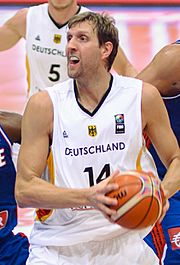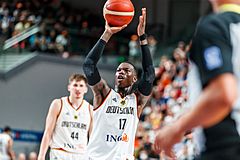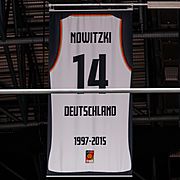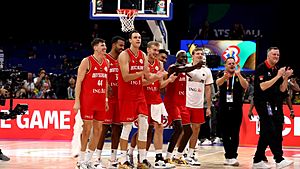Germany men's national basketball team facts for kids
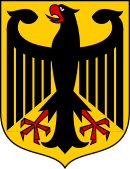 |
||||||||||||||||||||||||||||||||
| FIBA ranking | 3 |
|||||||||||||||||||||||||||||||
|---|---|---|---|---|---|---|---|---|---|---|---|---|---|---|---|---|---|---|---|---|---|---|---|---|---|---|---|---|---|---|---|---|
| Joined FIBA | 1934 | |||||||||||||||||||||||||||||||
| FIBA zone | FIBA Europe | |||||||||||||||||||||||||||||||
| National federation | Deutscher Basketball Bund (DBB) | |||||||||||||||||||||||||||||||
| Coach | Álex Mumbrú | |||||||||||||||||||||||||||||||
| Nickname(s) | Die Mannschaft (The Team) | |||||||||||||||||||||||||||||||
| Olympic Games | ||||||||||||||||||||||||||||||||
| Appearances | 7 | |||||||||||||||||||||||||||||||
| Medals | None | |||||||||||||||||||||||||||||||
| FIBA World Cup | ||||||||||||||||||||||||||||||||
| Appearances | 7 | |||||||||||||||||||||||||||||||
| Medals | ||||||||||||||||||||||||||||||||
| EuroBasket | ||||||||||||||||||||||||||||||||
| Appearances | 26 | |||||||||||||||||||||||||||||||
| Medals | ||||||||||||||||||||||||||||||||
|
||||||||||||||||||||||||||||||||
| First international | ||||||||||||||||||||||||||||||||
(Berlin, Germany; 7 August 1936) |
||||||||||||||||||||||||||||||||
| Biggest win | ||||||||||||||||||||||||||||||||
(Osnabrück, West Germany; 11 May 1989) |
||||||||||||||||||||||||||||||||
| Biggest defeat | ||||||||||||||||||||||||||||||||
(Tbilisi, Soviet Union; 4 June 1965) |
||||||||||||||||||||||||||||||||
|
Medal record
|
||||||||||||||||||||||||||||||||
The Germany men's national basketball team is a group of talented basketball players who represent Germany in big international games. They are often called Die Mannschaft, which means "The Team" in German. The German Basketball Federation helps organize and guide the team. Right now, Germany is ranked as one of the top basketball teams in the world!
For many years, between 1949 and 1990, there were actually two separate German national teams because the country was divided. One team represented West Germany and the other represented East Germany. But after Germany became one country again in 1990, these two teams joined together to form the single team we know today.
Germany has achieved some amazing things in basketball! They have played in the EuroBasket tournament 26 times, winning gold medals in 1993 and 2025. They also won a silver medal in 2005 and a bronze medal in 2022. In the FIBA Basketball World Cup, Germany has competed seven times, taking home the gold medal in 2023 and a bronze medal in 2002. At the Olympic Games, they have played seven times, with their best finish being fourth place in 2024.
Contents
A Look Back: Team History
Early Days and Olympic Debut
Germany joined FIBA, the international basketball organization, in 1934. They first played on the world stage at the 1936 Summer Olympics in Berlin, which was also the first time basketball was an Olympic sport! Germany played their first game against Switzerland and lost 25–18. After this, they didn't play in the EuroBasket tournaments in 1937 and 1939. This was a challenging time for the country, which affected their participation in sports.
Rebuilding After the War
After World War II, Germany was not allowed to play in international competitions until 1950. The country was also divided into West Germany and East Germany. Each had its own basketball team. The German Basketball Federation was started in 1949.
West Germany's team started playing again in the EuroBasket 1951 tournament. They had some tough games but managed to win their first game against Scotland. Over the next few decades, West Germany participated in several EuroBasket tournaments and even hosted the 1972 Summer Olympics in Munich.
In the 1980s, with young stars like Detlef Schrempf and Uwe Blab, the West German team started to improve. They played in the 1984 Olympics and reached the quarter-finals for the first time. They even hosted EuroBasket 1985 and finished in fifth place, showing great progress.
Germany Reunites and Wins Gold
After the reunification of Germany in 1990, a single German national team was formed. They qualified for the 1992 Summer Olympics. For the first time since 1985, NBA players like Detlef Schrempf and Uwe Blab could play for the national team.
At the Olympics, Germany won their first game against Spain. They also had a close win against Angola. However, they faced the famous "Dream Team" from the United States and lost. Germany still made it to the quarter-finals but lost to the team representing the former Soviet Union.
In EuroBasket 1993, Germany hosted the tournament. Even without Detlef Schrempf, the team surprised everyone! They reached the semi-finals for the first time by beating Spain in overtime. After another win against Greece, Germany won their first European title by defeating Russia 71–70. Christian Welp was named the tournament's Most Valuable Player (MVP).
The Dirk Nowitzki Era
In 1999, a 21-year-old basketball star named Dirk Nowitzki joined the national team. He quickly became a key player. In EuroBasket 1999, he led Germany to some important wins, helping them reach the quarter-finals.
Nowitzki continued to shine in EuroBasket 2001, scoring many points and rebounds. Germany reached the semi-finals but lost a very close game to Turkey. They then played for the bronze medal but were outlasted by Spain.
At the 2002 FIBA World Cup, Germany, led by Nowitzki, made history. They reached the semi-finals and then won the bronze medal game against New Zealand! Dirk Nowitzki was named the tournament's MVP for his incredible performance.
In EuroBasket 2005, Germany had another fantastic run. They made it to the final for the first time in 12 years, beating Spain in a thrilling semi-final. They ultimately won the silver medal, and Dirk Nowitzki was once again named the EuroBasket MVP. He also had an amazing game in the 2006 FIBA World Cup, scoring 47 points in a triple-overtime win against Angola.
Nowitzki helped Germany qualify for the 2008 Summer Olympics. This was a big achievement, but the team didn't make it past the first round. After the 2008 Olympics, Nowitzki took a break from the national team, returning for EuroBasket 2011. He played his last international tournament at EuroBasket 2015, where Germany hosted some games. After a tough tournament, the legendary Dirk Nowitzki retired from playing for the national team.
The Dennis Schröder Era and Recent Triumphs
Even after Dirk Nowitzki's retirement, Germany had a new rising star: point guard Dennis Schröder. He quickly became the team's leader in scoring and assists. Germany qualified for EuroBasket 2017 and reached the quarter-finals, with Schröder being one of the top scorers in the competition.
The team continued to perform well, qualifying for the 2019 FIBA World Cup. They had a strong qualifying campaign, winning all their first-round games. At the World Cup, they faced tough opponents and didn't advance past the group stage. However, Germany bounced back, qualifying for the 2020 Summer Olympics (which happened in 2021 due to the pandemic). They reached the quarter-finals there.
In EuroBasket 2022, Germany co-hosted the tournament. Before their first game, the team honored Dirk Nowitzki by retiring his number 14 jersey. This emotional moment seemed to inspire the team, as they had a fantastic tournament. They defeated Giannis Antetokounmpo and Greece in the quarter-finals, reaching the semi-finals for the first time in 17 years. Germany won the bronze medal, making it a memorable home tournament.
Germany's success continued at the 2023 FIBA Basketball World Cup. They had a perfect record in the preliminary phase. In the semi-finals, they achieved a historic victory, defeating the United States 113–111, to reach the World Cup final for the first time ever! In a thrilling final game, Germany beat Serbia 83–77 to become world champions! Dennis Schröder was named the tournament's MVP.
Following their World Cup triumph, Germany competed in the 2024 Summer Olympics. They had a strong performance, reaching the semi-finals for the first time in Olympic history. They finished the tournament in an impressive fourth place.
Germany's incredible journey continued into EuroBasket 2025. They had a dominant run, winning all their group stage games and advancing through the knockout rounds. In a hard-fought final, Germany defeated Turkey 88–83 to win their second European Championship! Dennis Schröder was once again named the tournament's MVP for his outstanding play.
Germany's Basketball Achievements
The German men's national basketball team has a proud history of competing in major international tournaments. They have participated in the FIBA Basketball World Cup 7 times, winning a gold medal in 2023 and a bronze medal in 2002. At the Olympic Games, they have made 7 appearances, with their best finish being 4th place in 2024. In the EuroBasket tournament, Germany has competed 26 times, securing gold medals in 1993 and 2025, a silver medal in 2005, and a bronze medal in 2022.
Team Players and Coaches
Current Team Roster
This is the team roster for the EuroBasket 2025.
| Germany men's national basketball team roster | ||||||||||||||||||||||||||||||||||||||||||||||||||||||||||||||||||||||||||||||||||||||||||||
|---|---|---|---|---|---|---|---|---|---|---|---|---|---|---|---|---|---|---|---|---|---|---|---|---|---|---|---|---|---|---|---|---|---|---|---|---|---|---|---|---|---|---|---|---|---|---|---|---|---|---|---|---|---|---|---|---|---|---|---|---|---|---|---|---|---|---|---|---|---|---|---|---|---|---|---|---|---|---|---|---|---|---|---|---|---|---|---|---|---|---|---|---|
| Players | Coaches | |||||||||||||||||||||||||||||||||||||||||||||||||||||||||||||||||||||||||||||||||||||||||||
|
|
|||||||||||||||||||||||||||||||||||||||||||||||||||||||||||||||||||||||||||||||||||||||||||
Team Lineup (Depth Chart)
| Pos. | Starting 5 | Bench 1 | Bench 2 |
|---|---|---|---|
| C | Daniel Theis | Johannes Thiemann | Leon Kratzer |
| PF | Franz Wagner | Oscar da Silva | Johannes Voigtmann |
| SF | Isaac Bonga | Tristan da Silva | |
| SG | Andreas Obst | Maodo Lô | |
| PG | Dennis Schröder | Justus Hollatz |
Coaches Through the Years
Many coaches have led the German national basketball team over the years. Here are some of them:
 Hugo Murero – (1935–1942)
Hugo Murero – (1935–1942) /
/ Theo Clausen – (1947–1951)
Theo Clausen – (1947–1951) Anton Kartak – (1951–1956)
Anton Kartak – (1951–1956) Theodor Vychodil – (1956–1961)
Theodor Vychodil – (1956–1961) Branimir Volfer – (1961–1962)
Branimir Volfer – (1961–1962) /
/ /
/ Yakovos Bilek – (1962–1968)
Yakovos Bilek – (1962–1968) Kurt Siebenhaar – (1968–1969)
Kurt Siebenhaar – (1968–1969) Miloslav Kriz – (1969–1971)
Miloslav Kriz – (1969–1971) Theodor Schober – (1971–1972)
Theodor Schober – (1971–1972) Dietfried Kienast – (1972–1973)
Dietfried Kienast – (1972–1973) /
/ Pascal Ezguilian – (1974–1976)
Pascal Ezguilian – (1974–1976) Raimondo Nonato De Azevedo – (1976)
Raimondo Nonato De Azevedo – (1976) Bernd Röder – (1976–1980)
Bernd Röder – (1976–1980) Terry Schofield – (1980–1982)
Terry Schofield – (1980–1982) Chris Lee – (1983–1984)
Chris Lee – (1983–1984) Ralph Klein – (1983–1986)
Ralph Klein – (1983–1986) Svetislav Pešić – (1987–1993)
Svetislav Pešić – (1987–1993) Dirk Bauermann – (1994)
Dirk Bauermann – (1994) Vladislav Lučić – (1994–1997)
Vladislav Lučić – (1994–1997) Henrik Dettmann – (1997–2003)
Henrik Dettmann – (1997–2003) Dirk Bauermann – (2003–2012)
Dirk Bauermann – (2003–2012) Svetislav Pešić – (2012)
Svetislav Pešić – (2012) Frank Menz – (2013–2014)
Frank Menz – (2013–2014) Emir Mutapčić – (2014)
Emir Mutapčić – (2014) Chris Fleming – (2014–2017)
Chris Fleming – (2014–2017) Henrik Rödl – (2017–2021)
Henrik Rödl – (2017–2021) /
/ Gordon Herbert – (2021–2024)
Gordon Herbert – (2021–2024) Álex Mumbrú – (2024–present)
Álex Mumbrú – (2024–present)
Amazing German Basketball Stars
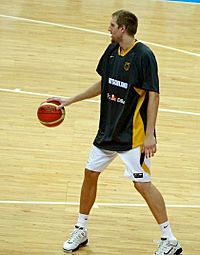
Many talented players have represented Germany. Some of the most famous include:
- Uwe Blab – A former NBA player.
- Shawn Bradley – Another former NBA player who also had German citizenship.
- Patrick Femerling – He played the most games for the national team (221 times!).
- Chris Kaman – A former NBA player who also had German citizenship.
- Dirk Nowitzki – A true legend! He was an NBA star, won an NBA Championship in 2011, and was MVP of both the 2002 World Cup and EuroBasket 2005. His number 14 jersey has been retired by the national team.
- Detlef Schrempf – The first German NBA star, a 3-time NBA All-Star.
- Dennis Schröder – A current NBA player and a key leader for the national team.
- Daniel Theis – A talented player who has played in the NBA.
- Franz Wagner – A current NBA player for the Orlando Magic.
- Moritz Wagner – Franz's brother, also a current NBA player for the Orlando Magic.
- Christian Welp – A former NBA player who scored the winning points in the 1993 EuroBasket final and was named MVP.
Players with International Roots
Germany's national team is known for having players whose families come from different countries. These players grew up in Germany and speak German fluently. Here are some examples:
- African-German: Stephen Arigbabu, Maodo Lô, Isaac Bonga, Ademola Okulaja, Dennis Schröder
- American-German: Shawn Bradley, Chris Kaman, Isaiah Hartenstein, Nick Weiler-Babb
- Brazilian-German: Oscar da Silva, Tristan da Silva
- Croatian-German: Dražan Tomić
- Serbian-German: Vladimir Bogojević, Marko Pešić
- Turkish-German: Mithat Demirel, İsmet Akpınar
German Players in U.S. College Basketball
Many German national team players have also played U.S. college basketball before becoming professionals. This experience helps them develop their skills. Some examples include:
- Uwe Blab – Indiana
- Oscar da Silva – Stanford
- Patrick Femerling – Washington
- Niels Giffey – UConn
- Elias Harris – Gonzaga
- Dirk Nowitzki – He did not play college basketball in the US, but went straight to the NBA.
- Ademola Okulaja – North Carolina
- Henrik Rödl – North Carolina
- Detlef Schrempf – Washington
- Franz Wagner – Michigan
- Moritz Wagner – Michigan
- Christian Welp – Washington
See also
 In Spanish: Selección de baloncesto de Alemania para niños
In Spanish: Selección de baloncesto de Alemania para niños
- Sport in Germany
- Germany women's national basketball team
- Germany men's national under-20 basketball team
- Germany men's national under-19 basketball team
- Germany men's national under-17 basketball team
- Germany men's national 3x3 team
 | Bayard Rustin |
 | Jeannette Carter |
 | Jeremiah A. Brown |


